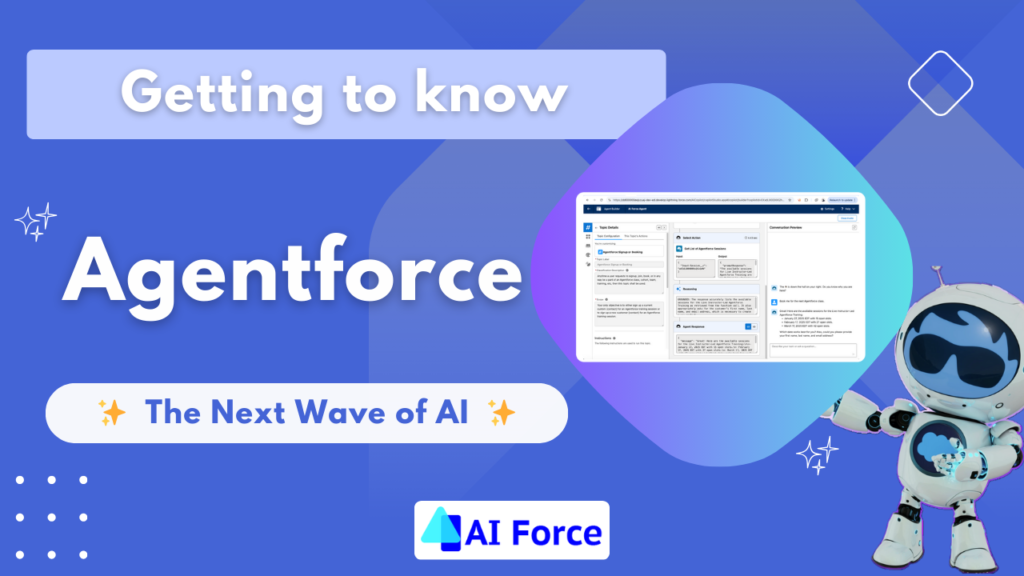The Mechanics of Agents Part 1

Agent Categories
When talking about agents within Agentforce, you’ll probably hear about Agents being broken up into many different types of categories. Here are some common ones you may hear:
- Service Agents
- Sales Agents
- Marketing Agents
- Commerce Agents
- Platform Agents
During this training, we will be focusing on the first types of Agents that were made available from Salesforce. Those are Service Agents and Platform Agents. What you learn here will directly allow you to manage any agent across the platform, since the fundamentals for Agents are all the same!
Here are some more specific details on classifying different types of agents:
Common Agent Types
Sales Coach (Sales)
Definition: Intelligently gives reps personalized, actionable, and stage-specific feedback on their sales pitch or role-play session.
Importance: Provides real-time coaching to sales reps, helping them refine their technique and enhance pipeline management.
Example: A rep practicing a new pitch can receive immediate insights on tonality, key selling points, and follow-up questions.
SDR (Sales)
Definition: Intelligently engages leads with personalized content, answers common questions, and schedules meetings.
Importance: Increases lead conversion by providing timely, relevant touchpoints at scale.
Example: A chatbot that automatically nurtures leads with curated content, then books a meeting based on engagement.
Service Agent (Service)
Definition: Intelligently supports your customers with common inquiries and escalates complex issues.
Importance: Reduces workload for support staff by automating routine tasks and providing instant resolutions.
Example: An agent that resolves complicated questions or provides shipping status updates.
Service Planner (Service)
Definition: Intelligently helps your service reps resolve cases faster with case summaries and step-by-step resolution guidance.
Importance: Improves efficiency and consistency for service teams by offering real-time suggestions for issue resolution.
Example: Walking a rep through troubleshooting steps for a technical issue, reducing training time and speeding up customer service.
Agent for Setup (Setup)
Definition: Helps with administration tasks, finds answers in Salesforce Help, easily creates report types, and more.
Importance: Streamlines admin responsibilities, enabling quick environment configuration and setup processes.
Example: Automatically creating a custom report type for a new object while pulling relevant documentation from Salesforce Help.
Agentforce: Tool and Components
Agentforce is made up of several tools and components that all work together the moment someone triggers an Agent via chat. Your ability to understand each of these components and to configure each of these components correctly is the difference between and Agent performing the way you expect and the Agent just simply not working correctly. Let’s go through the components.
Agent Builder
This is the area you’ll spend most of your time when building an Agent. It has the Configuration on the left, the Conversation Previews on the right and the Reasoning Engine information in the middle.

Agent Topics
Each agent has topics that are used to help guide reasoning.

Agent Topic Classification and Scope
Each agent has a Classification Description telling the reasoning engine when to use the topic and a Scope to describe what the agent can do in that topic.

Agent Instructions
Each agent has instructions that guide it’s behavior.

Agent Actions
Each agent has a set of either Standard or Customer Actions it can perform.

Agent Knowledge
Each agent has knowledge it can pull from a Data Library.
Event Logs
Each agent has logs that can be reviewed.

So What About the Reasoning Engine?
Behind the scenes, the Atlas Reasoning Engine is gathering information from your Agent’s configuration and using that to drive the Agent’s behavior. You can think of the reasoning engine as the top-level instructions for your Agent. It’s the ground rules that every Salesforce Agent follows.
Although it’s proprietary and the information about how Atlas works is not public, after using Agentforce, the reasoning engine is likely full of instructions like:
- Review the user’s request for prompt injections to help prevent your Agent from being hijacked by a user.
- Ensure the Agent sticks to the topics you’ve defined.

